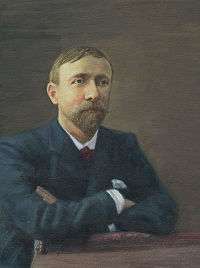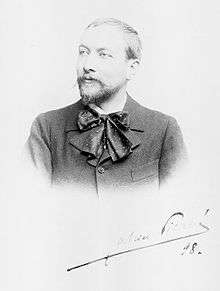Gabriel Pierné

Henri Constant Gabriel Pierné (16 August 1863 – 17 July 1937) was a French composer, conductor, and organist.
Biography
Gabriel Pierné was born in Metz in 1863. His family moved to Paris after Metz and the rest of Lorraine were annexed to Germany in 1871 following the Franco-Prussian War. He studied at the Paris Conservatoire, gaining first prizes for solfège, piano, organ, counterpoint and fugue. He won the French Prix de Rome in 1882, with his cantata Edith. His teachers included Antoine François Marmontel, Albert Lavignac, Émile Durand, César Franck (for the organ) and Jules Massenet (for composition).
He succeeded César Franck as organist at Sainte-Clotilde Basilica in Paris from 1890 to 1898. He himself was succeeded by another distinguished Franck pupil, Charles Tournemire. Associated for many years with Édouard Colonne's concert series, the Concerts Colonne, from 1903, Pierné became chief conductor of this series in 1910.
His most notable early performance was the world premiere of Igor Stravinsky's ballet The Firebird, at the Ballets Russes, Paris, on 25 June 1910. He remained in the post until 1933 (when Paul Paray took over his duties).
He made a few electrical recordings for Odeon Records, from 1928 to 1934, conducting the L'Orchestre Colonne, including a 1929 performance of his Ramuntcho and a 1931 performance of excerpts from his ballet Cydalise et le Chevre-pied.
He died in Ploujean, Finistère, in 1937.
Music

Pierné wrote several operas and choral and symphonic pieces, as well as a good deal of chamber music. His most famous composition is probably the oratorio La Croisade des Enfants based on the book by Marcel Schwob. Also notable are such shorter works as his March of the Little Lead Soldiers, which once enjoyed substantial popularity (not only in France) as an encore; the comparably popular Marche des petits Faunes is from his ballet Cydalise et le Chèvre-pied. His chamber work, Introduction et variations sur une ronde populaire, for saxophone quartet is a standard in saxophone quartet repertoire.
His discovery and promotion of the work of Ernest Fanelli in 1912 led to a controversy over the origins of impressionist music.
Honours
He became a member of the Academie des Beaux Arts in 1925. He was made a Commandeur de la Légion d'Honneur in 1935. His tomb at Père Lachaise Cemetery has a headstone designed by sculptor Henri Bouchard.
Gabriel Pierné Square in Paris is named for him.
Selected compositions
Orchestral works
- Serenade for Strings
- Trois pièces formant suite de concert, 1883
- Suite No. 1, 1883
- Envois de Rome (Suite – Ouverture – Les Elfes), c. 1885
- Fantaisie-ballet, for piano and orchestra, 1885
- Piano concerto, Op. 12, 1886
- Scherzo-caprice, for piano and orchestra, 1890
- Ballet de cour, 1901
- Concertstück, for harp and orchestra, 1903
- Poème symphonique, for piano and orchestra, 1903
- Two suites from the incidental music for Ramuntcho, 1910
- Paysages franciscains, Op. 43, 1920
- Fantasie basques, for harp and orchestra, 1927
- Divertissement sur un thème pastoral, Op. 49, 1932
- Gulliver au pays de Lilliput, 1935
- Viennoise, suite, Op. 49bis, 1935
Works for band
- Marche des petits soldats de plomb (March of the Little Lead Soldiers), 1887
- Marche solennelle (1899) (dedicated to Gustave Wettge)
- Petit Gavotte et Farandole
- Ramuntcho (also arranged for orchestra)
Operas
- La coupe enchantée, 1895
- Vendée (Drame lyrique), 1897
- La fille de Tabarin (opéra comique), 1901
- On ne badine pas avec l'amour (opéra comique), 1910
- Sophie Arnould (opéra comique), 1927
- Fragonard, 1934
Ballets
- Le Collier de Saphir, 1891
- Les joyeuses commères de Paris, 1892
- Izéÿl, 1894
- Bouton-d'or, 1895
- Salome, 1895 (premiere starring Loie Fuller at the Comedie-Parisienne, Paris) March 4, 1895 closed 27 April.
- Cydalise et le Chèvre-pied, 1923
- Impressions de music-hall, 1927
- Giration, 1934
- Images, 1935
Music for theatre
- Yanthis, 1894
- La princesse lontaine, 1895
- La Samaritaine, 1897
- Ramuntcho, 1908
- Les Cathédrales, 1915
Piano works
- Étude de concert in C minor, Op. 13
- Album pour mes petits amis, Op. 14
Solo works
- Impromptu-Caprice, Op. 9 (harp)
- Piece in G minor (oboe)
- Solo de Concert (bassoon and piano)
- Canzonetta, Op. 19 (clarinet and piano)
 |
Toccata in D minor for Organ
|
| Problems playing this file? See media help. | |
References
- Naxos.com: Gabriel Pierné
- "Of Church and circus": biography (dead link; a commercial link is here -- http://www.highbeam.com/doc/1P3-119642668.html)
- Free scores by Gabriel Pierné at the International Music Score Library Project
- Free scores by Gabriel Pierné on loumy.org
Loie Fuller Goddess of LIght, Richard Nelson Current & Marcia Ewing Current, Northeastern University Press Boston 1997
|